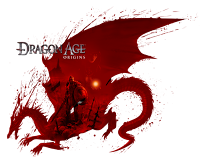A Song of An Assassin of Kings
A Song of Ice and Fire (what eventually was adapted to HBO’s Game of Thrones) gave me a strange kind of itch to scratch.
Although ASoIF is split up into several intertwined arcs, the one I’ve found most appealing was the battles for the Iron Throne and how it affects most of the people in Westeros, the country/continent where a bulk of the books takes place. I’ve been looking for a game that lets me relive the whole cutthroat politicking environment, but unfortunately, a whole lot of fantasy video games take the form of adventure stories. Not that there’s anything wrong with those types of games, but it wasn’t really what I was looking for.
 |
| Strangely, I haven't seen any flying lizards in the game so far |
I took a stab (no pun intended) at Dragon Age: Origins, since Bioware did position it as the successor to the classic Baldur’s Gate series, and it does have elements of fantasy politics that I’ve been looking for. It even incorporates some of the ASoIF plot devices: a supernatural threat looming (the Others in ASoIF, the Blight in DA:O), an undermanned military force looking to stop it (the Night’s Watch and the Grey Wardens), a throne up for grabs and the maneuverings of those so inclined to seize it.
However, DA:O gets the setting right, but the game mechanics themselves don’t feel satisfying. Some quests take too many detours (depending on the choices the player makes) and most aren’t really all that interesting, boiling down to glorified fetch quests or contract killings. The battle system itself, although similar to the hybrid realtime turn-based system of old Bioware games, doesn’t feel as solid as, for example, Knights of the Old Republic. In KOTOR, fights were interesting to play out because they took the time to animate weapon clashes, for example, and player turns were well-defined. DA:O feels like everyone has their own turn at the same time, so several times I’ve had attacks interrupted by an enemy, or they weren’t reacting properly to my own attacks. This is especially infuriating if you’ve performed a status-inducing attack and you’re wondering why nothing happened to the target, only to find that the status was nullified by an attack done on you a split second earlier. It’s just generally very sloppy, which is a shame because the world that Bioware created is relatively interesting.
So it was a pleasant surprise to play The Witcher 2: Assassin of Kings. CD Projekt Red, the developers, aren’t really a big company, but Witcher 2 is overall a very, very polished work, on par with, and sometimes surpassing, its fantasy contemporaries. It combines the deep lore of a Dragon Age or Baldur’s Gate (unsurprising since the game is based on a series of Polish fantasy novels) with the solid combat of an action game, but without degenerating into a Diablo-ish button mash/click fest.
Coincidentally, Kingdoms of Amalur: Reckoning by the (now defunct) Big Huge Games and 38 Studios, attempts the same thing: A sprawling RPG with solid combat, art by Todd McFarlane and R.A. Salvatore penning the scenario. Unfortunately, I haven’t gotten around to playing much with it, but it’s on my to-get list.
However, DA:O gets the setting right, but the game mechanics themselves don’t feel satisfying. Some quests take too many detours (depending on the choices the player makes) and most aren’t really all that interesting, boiling down to glorified fetch quests or contract killings. The battle system itself, although similar to the hybrid realtime turn-based system of old Bioware games, doesn’t feel as solid as, for example, Knights of the Old Republic. In KOTOR, fights were interesting to play out because they took the time to animate weapon clashes, for example, and player turns were well-defined. DA:O feels like everyone has their own turn at the same time, so several times I’ve had attacks interrupted by an enemy, or they weren’t reacting properly to my own attacks. This is especially infuriating if you’ve performed a status-inducing attack and you’re wondering why nothing happened to the target, only to find that the status was nullified by an attack done on you a split second earlier. It’s just generally very sloppy, which is a shame because the world that Bioware created is relatively interesting.
So it was a pleasant surprise to play The Witcher 2: Assassin of Kings. CD Projekt Red, the developers, aren’t really a big company, but Witcher 2 is overall a very, very polished work, on par with, and sometimes surpassing, its fantasy contemporaries. It combines the deep lore of a Dragon Age or Baldur’s Gate (unsurprising since the game is based on a series of Polish fantasy novels) with the solid combat of an action game, but without degenerating into a Diablo-ish button mash/click fest.
Coincidentally, Kingdoms of Amalur: Reckoning by the (now defunct) Big Huge Games and 38 Studios, attempts the same thing: A sprawling RPG with solid combat, art by Todd McFarlane and R.A. Salvatore penning the scenario. Unfortunately, I haven’t gotten around to playing much with it, but it’s on my to-get list.
 |
| It helps that the game sells its world very well |
Witcher 2 puts you in the boots of Geralt of Rivia. He is, as the title says, a Witcher, essentially the fantasy version of a Shaolin Monk-for-hire. By profession, they are monster hunters who’ve been genetically engineered and trained to be superheroes. He’s deemed a necessary evil by society, an abomination of nature who they need to wipe out bigger abominations of nature. Since his services are required in some rather unique situations, he’s also prone to being dragged into enormous political machinations by association.
Coincidentally, politicking leads to taking sides, and this is one of the few games where you feel like choices you make really do matter, in a Deus Ex-ish way. Choice leads to consequence, and certain actions lead you down alternative routes. Several times in the game, you’ll be given a quest where Geralt can do one of 2 or 3 options to proceed, but with an opportunity cost of missing on the other routes. In the most extreme case, one decision in Chapter 1 affects where and how Chapter 2 plays out, so a good chunk of the game is inaccessible, and the only way to know how the other choice plays out is to restart the game. It was this type of progression that I felt lent a weight to the story that isn’t in other games, especially when one thing I did was referenced in later conversations.
 |
| Sadly, Geralt finds himself in another fine mess |
But the one thing that pushes this above Dragon Age is the combat. It’s meaty and crunchy in a way that other RPGs aren’t. If you hit a bandit with a sword in Witcher 2, you notice them reel back. In Dragon Age, a number pops up above their head. It seems like a simple thing, but it matters a lot. It gives kick to your actions, and for each action, there is an equal and opposite reaction. Of course, this may just be Dragon Age betraying its desires to be the Next Baldur’s Gate (TM). It was clear that the combat in Dragon Age was meant to be played from an overhead view and the player getting into a rhythm of pause-issue commands-unpause. But, it also leads to a strange effect where you’re watching the life meters more than the on-screen action. It’s like the difference between refreshing the NBA site to check game scores, or watching the basketball game itself. Witcher 2 removes party members from the equation, which reduces your tactical superiority in favor of complete control over 1 character.
Witcher 2 also changes up how magic is used in RPGs. In the world of Witcher 2, magic is a rare thing, and only a select few are able to harness and use it. Geralt, even though he is a witcher, isn’t capable of learning spells beyond the few you have at the beginning of the game. Realistically though, these spells are practically all you’ll need. You’ll be pouring points into increasing their effectivity (if you choose to level up through the spellcaster skill tree) to keep up with the stronger enemies, but the main idea is to choose the correct spell to use at the exact moment.
Perhaps the most divisive gameplay aspect is the fact that you can’t heal during battle. There’s a skill that can be learned that increases Geralt’s health regeneration rate, but he can’t drink potions during battle and there’s no Cure spell either. Instead, you do what would be a logical course of action: prior to entering any dangerous area, you can meditate and drink potions to buff yourself up. These buffs remain active for a limited amount of time, but by only having them available in a safe area, you’re forced to assess your condition constantly, which, in a way, reflects the thinking of a Ranger who’s used to living in the wilderness and is constantly on his toes. I never really felt like it was a big deal, and it adds to the game’s unique flavour.
Perhaps the most divisive gameplay aspect is the fact that you can’t heal during battle. There’s a skill that can be learned that increases Geralt’s health regeneration rate, but he can’t drink potions during battle and there’s no Cure spell either. Instead, you do what would be a logical course of action: prior to entering any dangerous area, you can meditate and drink potions to buff yourself up. These buffs remain active for a limited amount of time, but by only having them available in a safe area, you’re forced to assess your condition constantly, which, in a way, reflects the thinking of a Ranger who’s used to living in the wilderness and is constantly on his toes. I never really felt like it was a big deal, and it adds to the game’s unique flavour.
 |
| Politics are a royal pain |
The main thing, though, is that Witcher 2: Assassin of Kings manages to satisfy that ASoIF itch through its story. The treachery, betrayal, epic battles, and even hanky-panky, are all present and accounted for. It earns its M for Mature rating earnestly, and, for once, I never felt like the ‘adult’ scenes were pandering or forced. It’s not the deepest or most original story, but it has the meat that you get with a Bioware epic, minus most of the fat.
The version I played was the Witcher 2 Enhanced Edition for Xbox 360. This includes more side quests and an additional epilogue cinematic from the original PC version. The X360 version also has several enhancements to the engine such that the lighting looks different (some would say improved) from the PC. However, you can get the Enhanced Edition content for the PC, too (minus the changes to the graphics engine) either as a patch to an existing Witcher 2 installation or as a new copy.
The version I played was the Witcher 2 Enhanced Edition for Xbox 360. This includes more side quests and an additional epilogue cinematic from the original PC version. The X360 version also has several enhancements to the engine such that the lighting looks different (some would say improved) from the PC. However, you can get the Enhanced Edition content for the PC, too (minus the changes to the graphics engine) either as a patch to an existing Witcher 2 installation or as a new copy.


Comments
Post a Comment